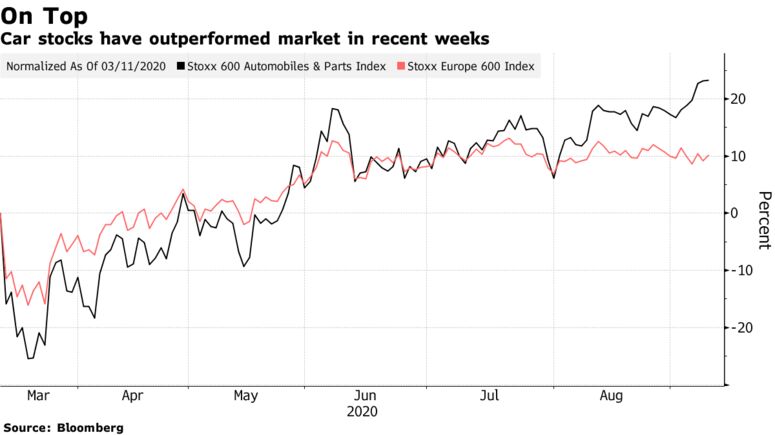Auto Stocks Bounce Back as Virus Seen Fueling Travel by Car
European auto stocks are emerging as a surprise winner as the coronavirus pandemic grinds on, with some analysts saying the outbreak is causing changes in consumer behavior that bode well for the industry and for share prices.
The Stoxx 600 Automobiles & Parts Index has gained 14% this quarter, the best performance among 19 industry groups in the wider regional equity benchmark, which has risen 2.2%. Every member of the gauge is up since the start of July, led by Germany’s Daimler AG, Finnish tire producer Nokian Renkaat Oyj and French parts maker Valeo SA. The car index is outperforming on Thursday in a seventh consecutive session -- the best winning streak in a year -- but is still down 12% for 2020.
China’s “spectacular comeback,” a second quarter that was “not quite as disastrous as feared,” stimulus measures in countries including Germany and France and the low valuation of the sector are among the reasons for the outperformance, said Bankhaus Metzler analyst Juergen Pieper.

“Recovery and outperformance should continue,” according to Pieper. “E-mobility is beginning to boom, which gives the sector a tech appeal and valuation could go up because of that.”
Changes that the pandemic is bringing about in people’s behavior, such as possible population shifts out of cities, also are a potential boost to vehicle demand.
“Simply speaking, people will fly less, use less public transport and will drive more,” Sanford C. Bernstein & Co. analysts Arndt Ellinghorst and Thanos Hadjiantonis said in a note on Wednesday. “Earnings and cash flows will bounce back.”
For 30 years, air travel has grown rapidly at the expense of passenger cars. Now, even a slight increase in the percentage of travel done by car can lead to a material increase in sales, according to Bernstein. Some companies could be back at their pre-Covid earnings level by 2021 or 2022, the analysts said.
Berenberg initiated coverage on European automotive suppliers, including buy recommendations on Valeo, national peer Faurecia SA and German rival Schaeffler AG. The broker cited supportive valuation and 2020 margins at a trough, with powertrain makers preparing for “a bolstered transition to electric vehicles” in national post-Covid-19 recovery plans.
- Tireworld Insight: Domestic tire makers eye overseas expansion
- Tireworld Insight: Price disparity severe between China's rubber exports and imports
- Tireworld Insight: China tire exports dependent on US market performance
- Tireworld Insight: SHFE rubber expected to move in tight range in short-term
- Tireworld Insight: Rubber futures to test near-term resistance at 15,000 yuan/tonne
- Tireworld Insight: China’s tire industry on track of rapid growth






